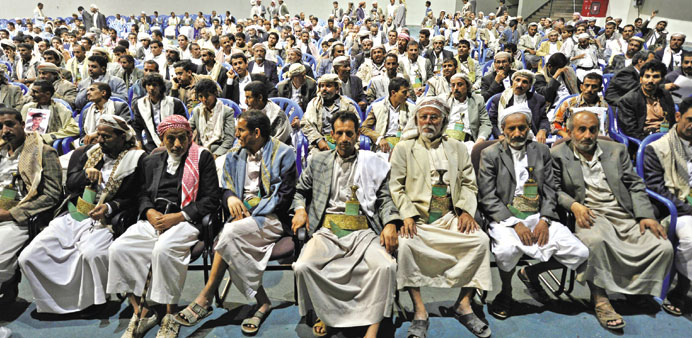Yemeni tribesmen attend a gathering calling on army authorities to track down Al Qaeda militants responsible for the killing of 14 soldiers a week ago, in Sanaa.
An influential Al Qaeda leader in Yemen has praised Islamic State jihadists for their “victories in Iraq” but without pledging allegiance to their self-proclaimed “caliph” or leader, Abu Bakr al-Baghdadi.
“I congratulate all the mujahedeen on different fronts and all Muslims for the victories won by our brothers in Iraq against the puppets (of Shia Iran),” ideological leader Ibrahim al-Rubaish says in a video posted online.
Rubaish is considered to be the religious affairs chief of Al-Qaeda in the Arabian Peninsula (AQAP), the Yemen-based franchise of the jihadist network, formed in a 2009 merger of its Saudi and Yemeni branches.
“Who does not welcome the victories of Sunnis and the defeat of (Nuri al-) Maliki’s gangs that have mistreated the Sunnis?” he asks of Iraq’s controversial Shia premier who continues to defy the president and international pressure to quit.
Maliki’s policies in Iraq were widely blamed for widening sectarian divisions, causing a lack of confidence in the government and contributing to the rise of the Islamic State jihadists.
However, Rubaish held back from giving his support to Baghdadi, who at the end of June proclaimed the establishment of a caliphate straddling Iraq and Syria, with himself as “leader for Muslims everywhere”.
The AQAP chief instead urged “an end to infighting between (Sunni) mujahedeen”, and called for “a common front to battle the enemies of our community, the puppets of (Shia) Iran”.
The Al Qaeda branch in Yemen is considered by the US to be the deadliest franchise of the extremist network.
AQAP remains faithful to Ayman al-Zawahiri, the Egypt-born successor to Al Qaeda founder Osama bin Laden.
Al Qaeda in the Islamic Maghreb (AQIM), another franchise in the network, last month rejected the declaration of an Islamist caliphate in Iraq and Syria, saying it had “defects” that jihadist leaders should rectify. AQIM also reiterated its allegiance to Zawahiri.
Plot to kill former president Saleh foiled
An aide to Yemen’s former president Ali Abdullah Saleh said yesterday his security team had uncovered a plot to kill him with explosives planted in a tunnel running to a mosque inside his residential compound in Sanaa.
Yemen’s authorities said they were investigating.
Saleh, who stepped down in 2012 amid mass protests against his rule after more than three decades in office, remains an influential figure in the country and still has many enemies.
He has survived at least two assassination attempts, the latest in June 2011 when he sustained serious burns and several senior officials and aides were killed.
Abdullah al-Mughrabi, Saleh’s private secretary, said the plot came to light following a tip-off to his security guards from one of the people involved in digging the tunnel.
“Initial investigations showed that the tunnelling began four months ago and its purpose was to assassinate the former president and his aides,” Mughrabi told Reuters. “The tunnel had reached under a small mosque at the house which is used by the former president and top leaders of his political party.”
Mughrabi said Saleh’s security went to inspect the tunnel and detained five people. Three of them were handed to Yemen’s top security team, a committee headed by the minister of interior.
An interior ministry official confirmed that three suspects had been turned over to the authorities by Saleh’s security team and said others were being sought for questioning, but declined to give further details.
Saleh retains the post of head of the General People’s Congress, the former ruling party and a main partner in the coalition government that was set up after he stepped aside.
His departure under a Gulf-brokered power transfer deal in which his deputy, Abd-Rabbu Mansour Hadi, succeeded him, was accompanied by bitter disputes, including over his being granted immunity from prosecution by parliament.
Critics say the former president abused his office for personal gain and must stand trial for it. Saleh has denied any wrongdoing.
Yemen’s central government is struggling to restore its authority after several years of political upheaval and insecurity.

